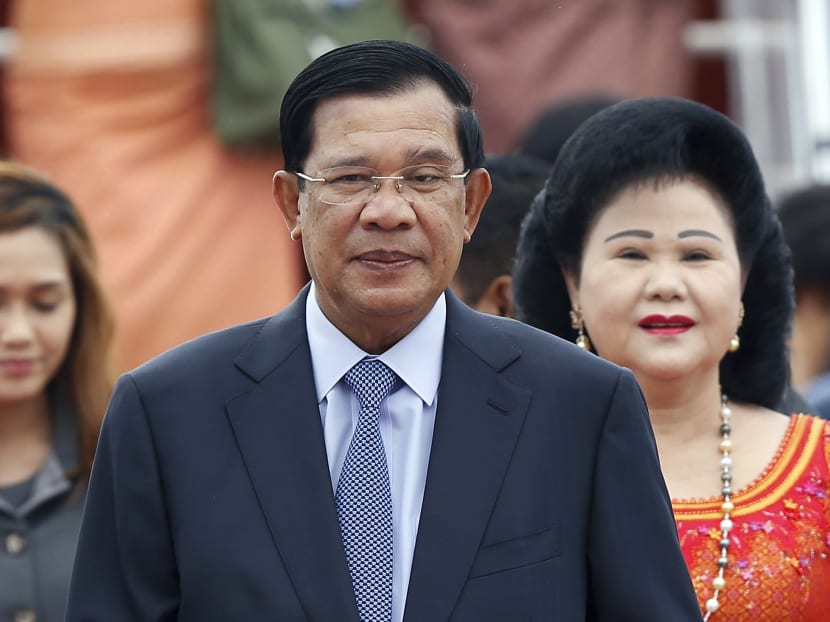Hun Sen denies Cambodia caved in to Chinese pressure on Asean statement
PHNOM PENH — Cambodian Premier Hun Sen lashed out on Monday (June 20) at claims his government had bowed to Chinese pressure to help scupper a joint statement by Southeast Asian nations on the South China Sea.

Cambodia's Prime Minister Hun Sen and his wife Bun Rany arrive for the 27th Association of Southeast Asian Nations (ASEAN) summit, in Sepang, Malaysia. Photo: AP
PHNOM PENH — Cambodian Premier Hun Sen lashed out on Monday (June 20) at claims his government had bowed to Chinese pressure to help scupper a joint statement by Southeast Asian nations on the South China Sea.
In an angry speech, Mr Hun Sen also accused an international court of political bias as it prepares to rule on a sea dispute between the Philippines and China.
The Hague-based Permanent Court of Arbitration is expected to rule against Beijing when it delivers its verdict in the coming weeks.
Last week a meeting of foreign ministers from China and the 10-member Association of South-east Asian Nations (Asean) in Kunming ended in chaos and renewed allegations of regional bullying by Beijing.
The diplomatic fracas erupted when Malaysia released a joint statement from Asean members voicing “serious concerns” at land reclamation and other activities, in reference to China’s extensive island-building in the disputed waters of South China Sea. But the statement was suddenly retracted for reasons that have yet to be fully explained.
The incident was seen as another example of Asean’s inability to present a united front to China as it ramps up its presence in the waterway.
Several news outlets have quoted Asean diplomatic sources as saying that Laos and Cambodia — historically China’s strongest regional allies — were instrumental in scuppering the consensus statement.
Mr Hun Sen described those claims as “unacceptable”.
“It is very unjust for Cambodia,” he said, accusing unnamed countries of “using Cambodia to counter China”.
“They use us and curse us,” he added.
Mr Hun Sen also hit out at the Hague-based arbitration court. “This is not about laws, it is totally about politics. I will not support any judgement by the court,” he said, adding that the case was a “political conspiracy between some countries and the court”.
China claims nearly all of the South China Sea despite competing partial claims by Asean members the Philippines, Vietnam, Malaysia and Brunei, as well as Taiwan.
In 2012, Asean foreign ministers failed to release a joint statement for the first time at the end of their annual gathering, with the Philippines blaming event host Cambodia for blocking criticism of China.
After the retraction, the Malaysian Ministry of Foreign Affairs said that Asean had unanimously agreed on the hard-hitting statement on rising tensions in the South China Sea.
“Subsequent developments pertaining to the media statement took place after the departure of the Asean foreign ministers,” said the ministry, referring to the retraction hours later.
Manila had earlier corroborated that there had been unanimous support within Asean for the statement when Malaysia issued it.
During the two-day meeting, China had pushed hard for a joint statement with all Asean members to express consensus on the South China Sea. But there was no agreement within Asean, which instead agreed on the text for its media statement.
TODAY understands that China lobbied strongly against the move, resulting in some Asean countries withdrawing support for the bloc’s statement at the last minute. This meant none could be issued as the group operates by consensus.
Some observers say Kuala Lumpur had released the statement to signal its unhappiness with China’s aggressive approach at the meeting; others suggest that because the meeting was proposed by its foreign minister,
Malaysia was eager to profile its role.
It is understood that all Asean foreign ministers are in the process of putting their positions in writing, to clarify each country’s position. AGENCIES









